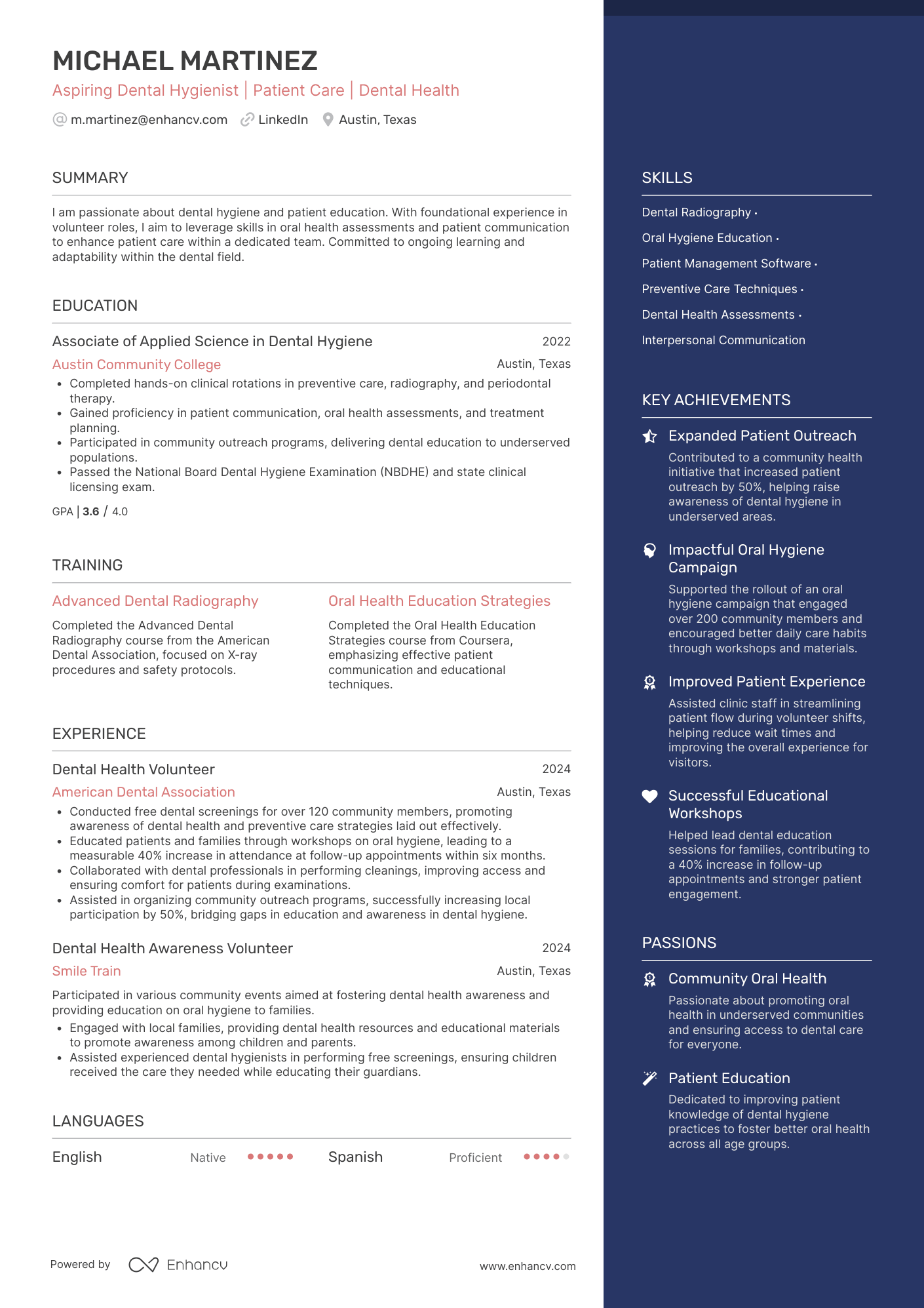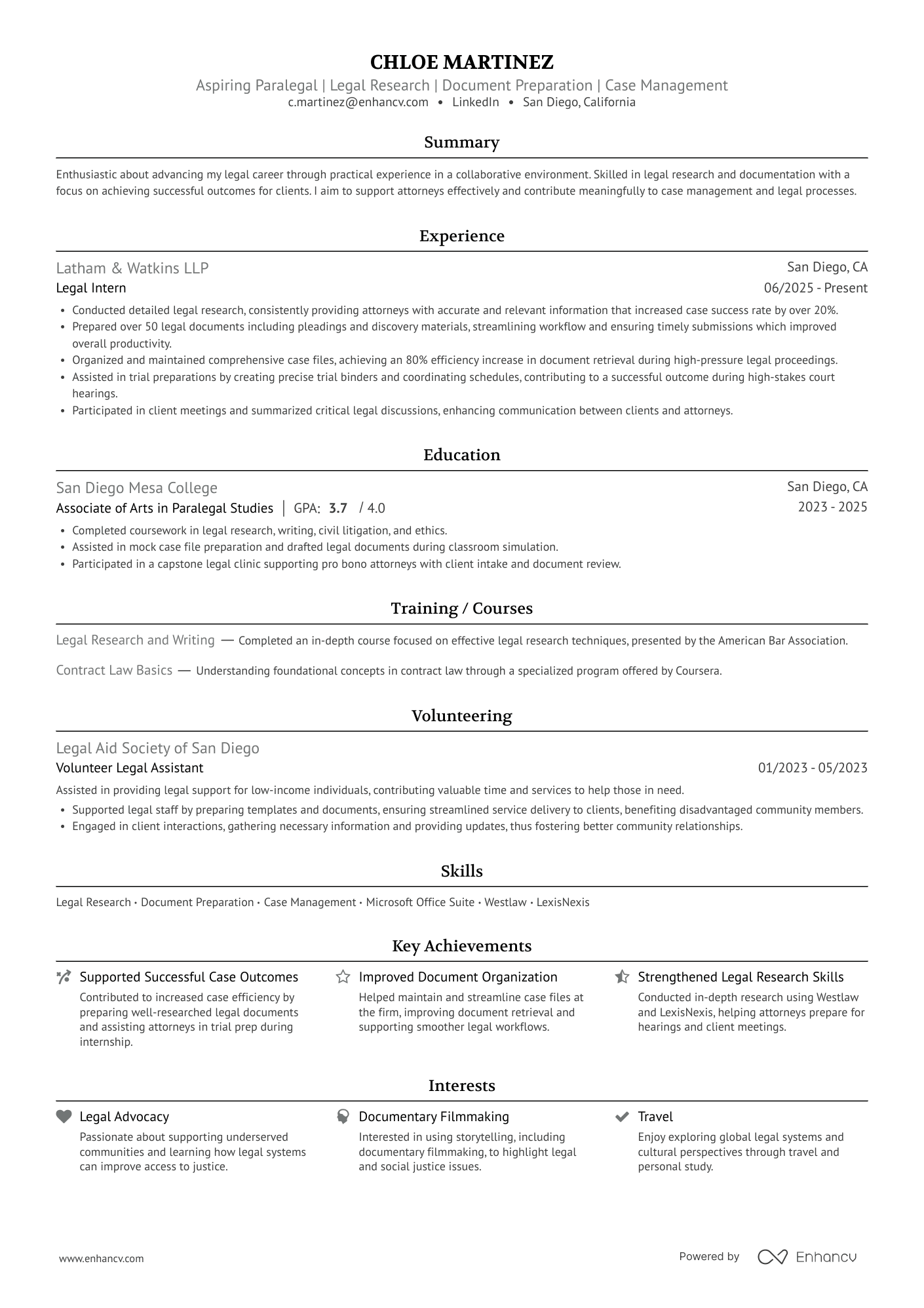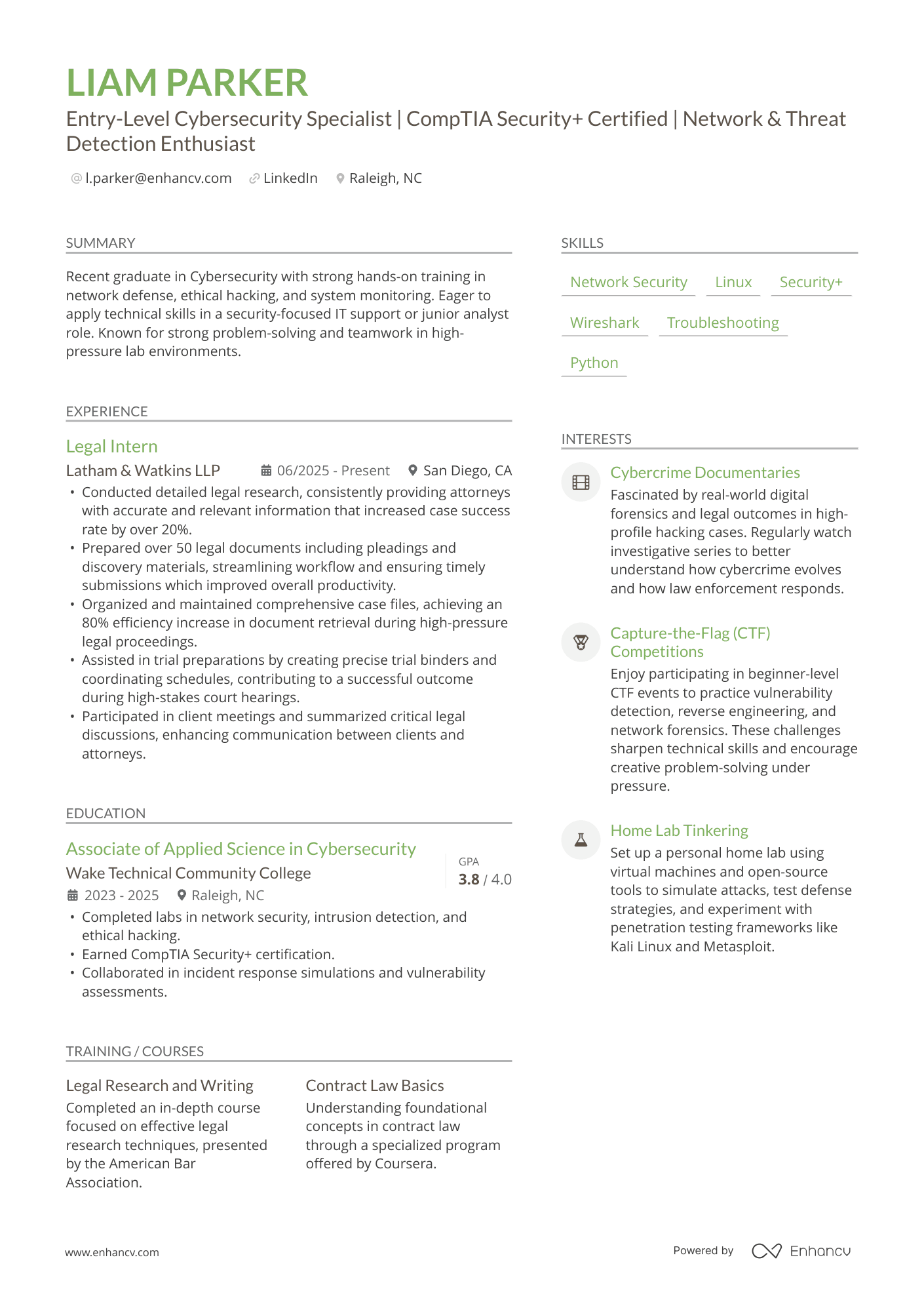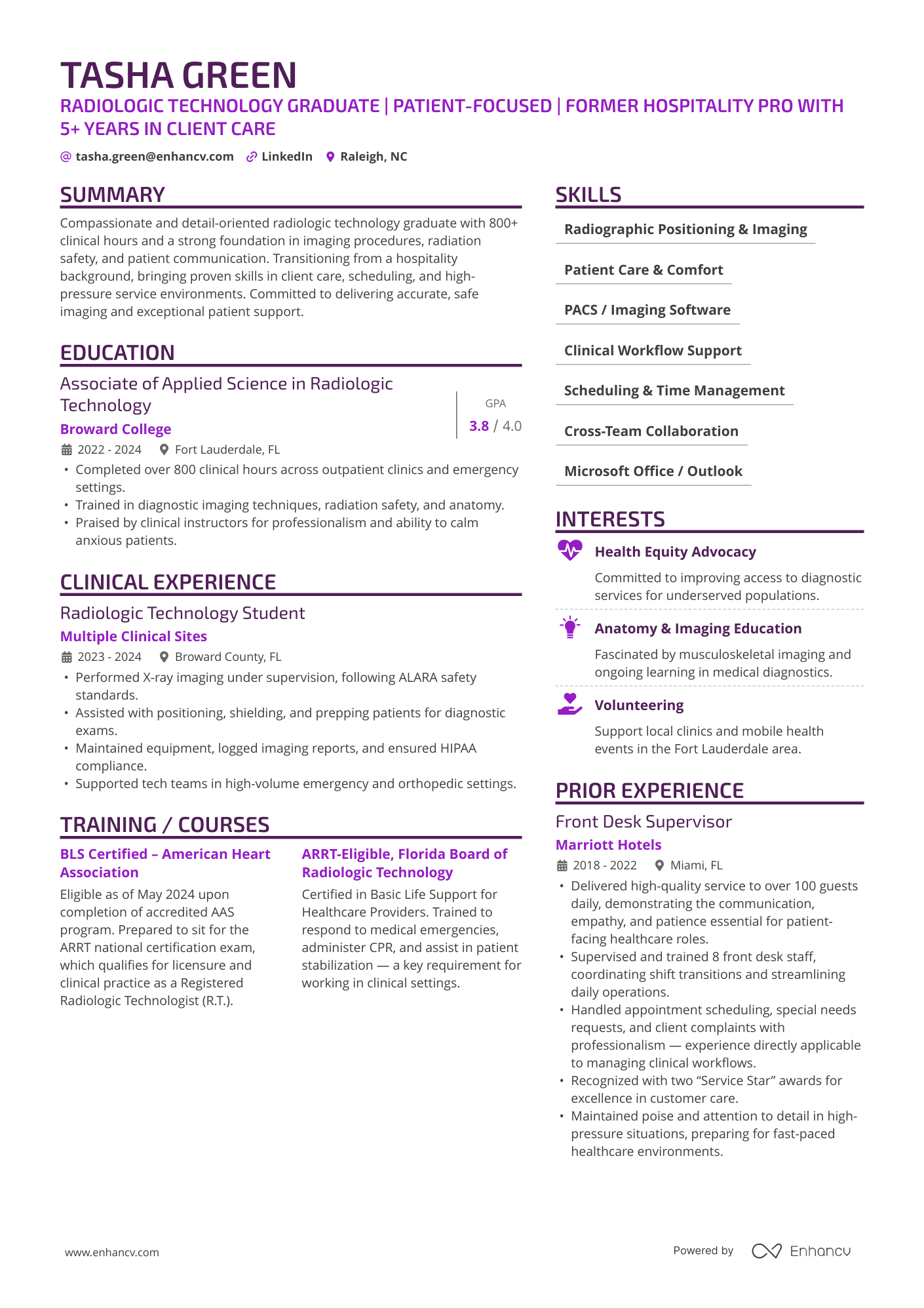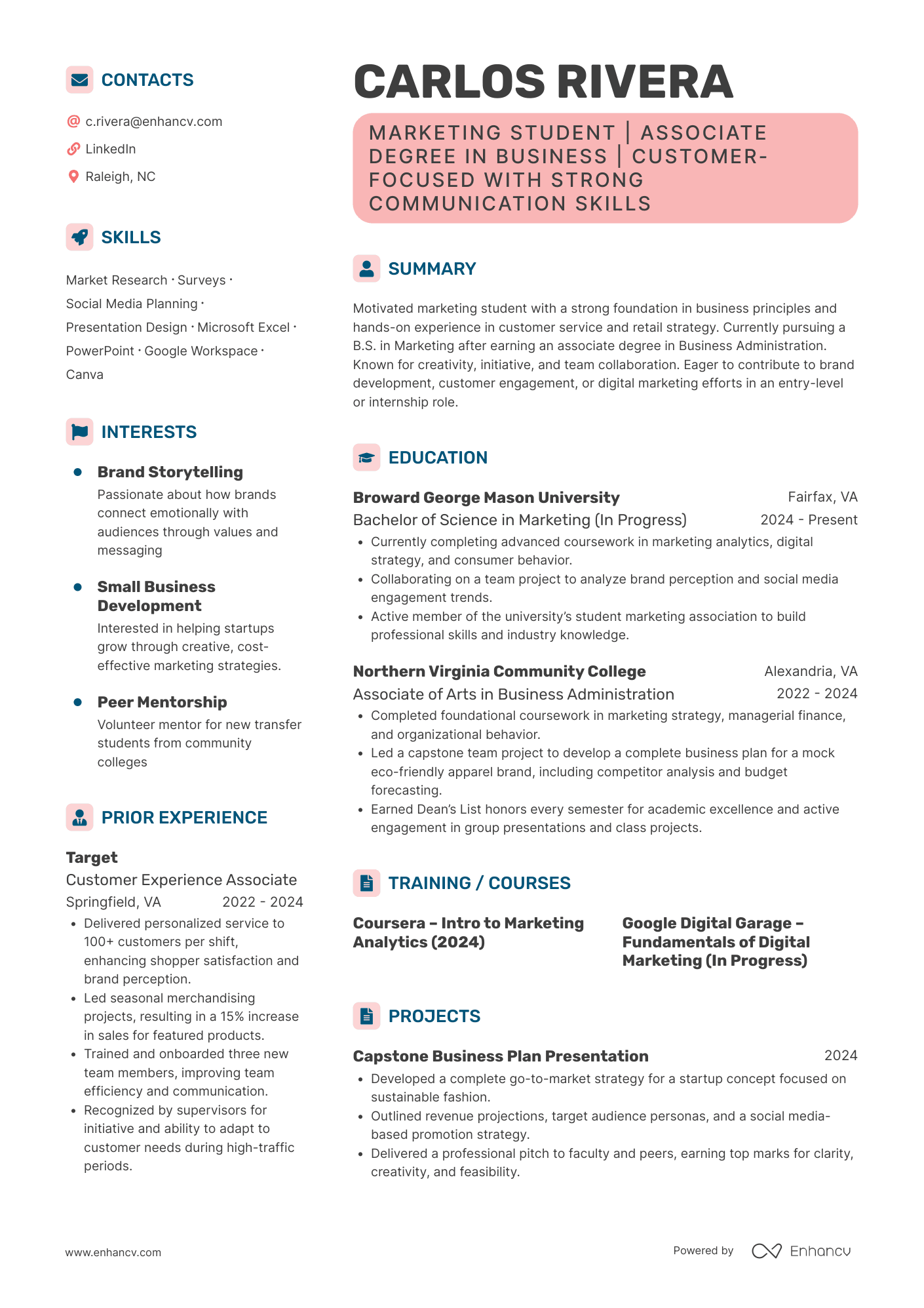Your associate degree worked hard for you—now let it work on your resume. Whether you're fresh out of school, changing careers, or climbing the ladder, how you list your associate degree can help (or hurt) your chances.
In this guide, we’ll show you exactly how to list your degree on a resume, when to use an abbreviation for associate degree, and what to include (or skip) depending on your goals.
Plus, you’ll see real resume examples and learn what you can do with an associate degree—beyond just filling in space.
Let’s begin.
Key takeaways
- An associate degree can qualify you for many skilled roles and should be listed clearly on your resume.
- Place it at the top of your Education section if it’s your highest or most relevant qualification.
- Include your degree type, school, graduation date, and GPA—if it strengthens your application.
- Use bullet points for relevant coursework, honors, or projects, especially if you’re early in your career.
- Skip listing your associate degree if you hold a more advanced degree and your work experience outweighs it.
- Abbreviations like AA, AS, and AAS are resume-friendly and widely recognized across industries.
Have a resume already? Run it through our AI Resume Checker—for free!
Is your resume good enough?
Drop your resume here or choose a file. PDF & DOCX only. Max 2MB file size.
What is an associate degree?
An associate degree is an undergraduate degree that you receive after completing a study, typically two to three years. This level of academic qualification falls right between a high school diploma and a bachelor’s degree.
The most common types of associate degrees are the Associate of Arts (AA) and Associate of Science (AS).
If you have an associate degree, you can qualify for many skilled, technical, and healthcare roles that don’t require a bachelor’s degree but still offer good pay and advancement potential.
For example:
- Registered Nurse (ADN)
- Web Developer
- Dental Hygienist
- Engineering Technician
- Paralegal
What comes after an associate degree?
With the right associate degree, you can transfer to a university and finish a bachelor’s in just two more years—saving time and money if your credits transfer smoothly.
Мany people continue by earning certifications or taking professional courses to qualify for specific roles.
Others gain experience on the job and move up through promotions or employer-supported training.
In short, what comes after an associate degree depends on your goals—whether it’s starting a career, continuing your education, or growing through hands-on experience.
Should you include an associate degree on a resume?
Your associate degree should be listed in the Education section of your resume—the standard place employers expect to find it. However, you need to be strategic about how much focus you give it.
If you’re just starting out and don’t have much work experience yet, it’s only natural you give more prominence to your education. It’s even better if you can show some projects or courses that helped you develop your skills and mindset during your studies.
Another scenario where your associate degree could add value is if you’re changing careers, and your studies are relevant to the position you’re pursuing.
What do industry experts and hiring managers say?
Employers often view associate degrees as a sign that you have practical skills and are ready to work. In some jobs, it's even the minimum required. But for roles that focus more on theory or leadership, a bachelor’s degree is usually preferred.
Hiring managers like associate degrees when they match the job and are backed by experience or certifications. Still, some positions—especially those involving strategy or management—may prefer someone with a four-year degree.
When to skip the associate degree
If you have more advanced education, like a bachelor’s or master’s degree, it’s usually fine to leave the associate degree off your resume and list only the highest one. Employers typically assume you completed earlier education to reach that level.
You might also skip detailed degree info if your work experience speaks for itself. In that case, just listing the degree briefly—without dates or specifics—is enough.
How to list an associate degree on a resume
So far, so good—now comes the part where most people get stuck: how exactly should you list an associate degree on your resume?
Before we break it down step by step, here’s a simple example of how to list your associate degree:
Associate of Science in Business Administration, XYZ College, 2022
This one-line format includes everything hiring managers and applicant tracking systems (ATS) expect: degree type, major, school name, and graduation year.
For ATS optimization, consider including both the full name and its abbreviation (e.g., Associate of Science (AS) in Business Administration) so your resume is picked up by all keyword scans.
Where to place your associate degree
Your associate degree belongs in your Education section, but its position depends on your overall education level and work experience:
- If it’s your highest degree, list it at the top of the Education section and make it stand out.
- If you also have a bachelor’s or master’s, those should come first, and the associate degree can follow as supporting education.
Also consider where the Education section sits on your resume overall:
- Put it above work experience if you're a recent graduate, currently in school, or making a career change and your education is more relevant than past jobs.
Check out this dental hygienist resume:
- Otherwise, it should come below your work experience but above skills, certifications, or volunteer work.
Here’s a paralegal resume to illustrate:
Ultimately, tailor the formatting of your degree to match what the job description emphasizes—whether that’s technical training, recent education, or hands-on experience.
Also, make sure the way you list your degree is consistent across your resume, LinkedIn, and any online application forms—small differences can look sloppy or confuse hiring managers.
What to include (and what to skip)
Start by listing your degree name (e.g., Associate of Science) and the institution name right beneath it. You can optionally include:
- Location of the school
- Graduation year (especially if you graduated recently or are still in school)
- GPA, but only if it’s strong (3.5 or above) and you have limited work experience
If you’ve been in the workforce for a few years, it’s perfectly fine to leave out the date and GPA.
To give your degree context, you can include bullets. Keep in mind they should add clear value–like relevant courses, hands-on projects, academic honors, or certifications earned during your studies.
They're most useful if you're a recent graduate, making a career change, or have limited work experience.
If you already have solid work experience, it's better to keep this section simple to avoid clutter.
Here’s an example that an IT support analyst could use:
- •Completed coursework in cybersecurity, networking, and Python programming
- •Capstone project: Built a mobile app to track and analyze energy usage data
- •Earned CompTIA A+ certification before graduation
What about international contexts?
If you’re applying internationally, keep in mind that associate degrees may be called differently depending on the country.
For example, in the UK you might see “Diploma of Higher Education” listed in a similar spot, while in Australia “Associate Degree of Applied Science” is a common variant.
If your degree was earned online or through a hybrid program, you can list it the same way as an in-person degree—most employers care more about accreditation and skills gained than the delivery format.
What’s the abbreviation for an associate degree?
Whereas a bachelor’s and a master’s degree use more familiar formats like B.A. or M.S., associate degrees have a few different abbreviations, depending on the type of program you completed.
Here are some of the most common associate degree acronyms:
Abbreviations and their meanings
| Abbreviation | Meaning |
|---|---|
| AA | Associate of Arts |
| AS | Associate of Science |
| AAS | Associate of Applied Science |
| ADN | Associate Degree in Nursing |
| AFA | Associate of Fine Arts |
Each of these is a recognized associate’s degree abbreviation and is widely used in resumes, job applications, and school documentation.
What does associate mean, exactly?
Associate comes from the idea of being connected to or aligned with further academic study.
Resume examples: Listing an associate degree for different career stages
Let’s see a few more examples covering different career stages where you might list an associate degree.
Entry-level resume
A clean, skills-focused resume for a recent cybersecurity graduate applying to entry-level IT or security roles, with emphasis on hands-on training and certifications.
Career switcher resume
A resume tailored for a healthcare career pivot, blending clinical training with transferable customer service experience from the hospitality industry.
Ongoing education resume (Associate + Bachelor’s)
An early-career resume for a business student transferring into a marketing program, highlighting part-time work, education progress, and project-based experience.
Space-saving format
Best for when space is tight or the degree is less central to the role.
A.S., Business Administration — Austin Community College
Expected or in-progress degree format
Useful for students or recent grads who haven’t yet finished their program.
Associate of Applied Science in Graphic Design (Expected May 2026) Minneapolis Community & Technical College
Frequently asked questions about associate degrees on resumes
Got a question or two? Check out the section below.
Do you put your associate's degree after your name?
Generally, no. Unlike advanced degrees such as a Ph.D., M.D., or MBA, associate degrees (like AA or AS) are not typically listed after your name in professional settings. Instead, include them in the Education section of your resume or LinkedIn profile.
Do employers check an Associate's degree?
Yes, especially if the degree is relevant to the job or required by the employer. They may verify it through background checks, third-party services, or by contacting the issuing college. It’s important to be honest about your education.
Does an associate degree count as a degree?
Yes, an associate degree is a legitimate academic credential. It’s considered an undergraduate degree that provides foundational knowledge and often prepares you for either entry-level jobs or transfer into a bachelor’s program.
Can two associate degrees equal a bachelor's?
No, earning two associate degrees doesn’t automatically add up to a bachelor’s. A bachelor’s requires upper-level coursework and a specific credit structure that associate degrees don’t fulfill on their own.
Which is better, AA or AS degree?
Neither is inherently better—it depends on your goals. An AA (Associate of Arts) is ideal for students planning to transfer into liberal arts or humanities majors, while an AS (Associate of Science) is better for those pursuing science, tech, or healthcare fields.
What are the disadvantages of an associate's degree?
While associate degrees offer a faster and more affordable path into the workforce, they may limit advancement into leadership roles or highly specialized positions that often require a bachelor’s or higher. In some industries, employers may favor candidates with four-year degrees.
Conclusion
Your associate degree can do more than fill space—it can open doors. List it where it counts, highlight what matters, and let it speak to the job you want. With the right placement and polish, it can be a quiet but powerful advantage.
Make one that's truly you.




